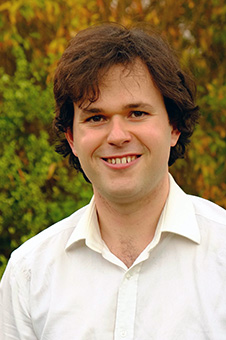Women with gestational diabetes are seven times more likely to develop type 2 diabetes than those without, yet over a ten-year period only half of these women were tested for diabetes within six months of giving birth, a new University of Otago study reveals.
Anonymised data from the Ministry of Health's National Collections was used to identify 14,443 women who had gestational diabetes for the first time between 2005 and 2015.
Of those women, 41 per cent (5,903) had a recommended test for type 2 diabetes within three months postpartum, 53 per cent (7,699) within six months, and 61 per cent (8,814) within 12 months. There was almost no improvement in the proportion tested over the study period.

Dr Andrew Sise.
Lead author Dr Andrew Sise, who undertook the research during postgraduate study at the Department of Preventive and Social Medicine, says the number of women being tested was much lower than researchers had hoped for.
“A systematic review in 2009 found women with gestational diabetes had a seven-fold increased risk of developing type 2 diabetes when compared to those without,” Dr Sise explains.
“The occurrence of gestational diabetes provides an important insight into someone's future type 2 diabetes risk. The results of this study show that opportunities to protect the health of women with gestational diabetes through early detection and diagnosis of type 2 diabetes are being missed.”
Guidelines from the Ministry of Health recommend all women with gestational diabetes receive a blood test for type 2 diabetes at three months postpartum, then yearly. Prior to 2014, it was recommended that screening occurred at six to eight weeks postpartum.
The study, published in Diabetes Research and Clinical Practice, also revealed ethnic and regional disparities.
Only 35 per cent of Māori women received a recommended test by six months postpartum, which was particularly concerning, Dr Sise says.
“We know that there are already major inequities in provision of healthcare between Māori and non-Māori in New Zealand. This adds to that picture and it needs to be improved.”
Regionally, testing rates ranged from less than 20 per cent in some areas of Aotearoa to more than 60 per cent in others.
“We were quite surprised by this.
“It's worrisome that if you lived in some places you'd have had a very low chance of receiving a test. Ideally, everywhere would have a high rate of testing.”
Early detection of type 2 diabetes, or prediabetes, means treatments can be put in place early to prevent or delay harms to health.
Left undiagnosed and untreated, type 2 diabetes can cause long-term health issues such as kidney disease, visual impairments, heart attacks, strokes, and problems with circulation.
While the study did not investigate why there are problems with testing coverage, it does reveal some important issues which need to be addressed.
“The health system needs to ensure that women who have had gestational diabetes are appropriately followed up, and that type 2 diabetes screening is provided in a way that is accessible to them,” Dr Sise says.
“Efforts to improve postpartum diabetes screening for women with gestational diabetes should look beyond just increasing screening overall, and ensure that it occurs fairly across all population groups.
“The large gap in screening between Māori women with gestational diabetes and women of other ethnic groups is especially concerning, and must be addressed.”
Publication details
Are women with gestational diabetes being screened for type 2 diabetes following pregnancy? A nationwide retrospective cohort study in Aotearoa New Zealand
Andrew Sise, Sarah Donald, Kirsten J Coppell, David Barson, Sue Crengle, Lianne Parkin
Diabetes Research and Clinical Practice
For more information, contact:
Jessica Wilson
Adviser Media Engagement
University of Otago
Mob +64 21 279 5016
Email jessica.wilson@otago.ac.nz
Find an Otago expert
Use our Media Expertise Database to find an Otago researcher for media comment.